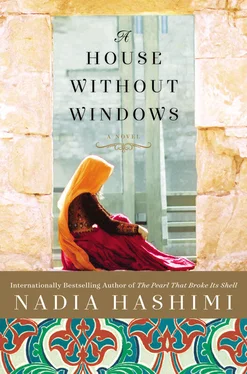As murshid, Zeba’s grandfather was a spiritual guide, offering invaluable blessings and a connection to the Almighty. Kamal’s grandfather brought to the table a more earthly benefit, alliances with all the right people in the new government. Zeba’s family owned a great deal of land and needed highly placed friends to secure their hold on it.
In a demonstration of brotherly commitment, the two men orchestrated a marriage, tying their families together with a union that would create common blood.
Zeba’s mother, Gulnaz, had protested the marriage, begging her father to reconsider the arrangement. Her husband’s family, out of respect for the murshid, had agreed to his suggestion years ago and were of no help.
She is young and it is a bad time for a marriage, Gulnaz insisted. Let us wait a bit more.
The Soviets had retreated nearly sixteen years ago but in the absence of any real leadership or government, Afghanistan had spiraled into a civil war. Her fate was still unclear.
If you’re waiting for the fighting to end, the murshid had retorted , then Zeba may never marry. History has taught us that the fighting won’t stop until the last drop of Afghan blood has been spilled.
Kamal and Zeba were married in 1996 in a part of the country uncontrolled, as of yet, by the Taliban. It was an austere ceremony and celebration, marked by the rhythm of a dhol drum and the chiming of the tambourine. The newlyweds knew nothing about each other. Zeba shook her head to think of that first year, living in the family compound with her new husband, wishing desperately to return to her home where her mother lived with Rafi and his bride of one year, a woman Zeba resented for stealing her brother’s attentions.
Kamal, when they first married, did what he could to put her at ease. When he saw her tense and shy away, he found ways to endear himself to her. He told jokes. He ate what she cooked and asked for a second plate. He spoke to her about little things and big things and even brought her a gift here and there. A bag of sweets, a pair of shoes. Zeba felt herself relax with the attentions of her new husband. When Kamal was at his best, Zeba felt like she was living out the romantic songs played on the radio. In truth, the last time she’d been so content had been before her father had walked into the horizon and disappeared forever.
Zeba’s thoughts drifted to a time long ago when her husband’s brother had purchased a television and a DVD player. They’d bragged about it for a month before the women in the family organized an evening where they could get together and watch an Indian movie. Zeba had been invited too, and she’d sat cheerfully with the women, mesmerized by the whirl of colors, women dancing in dazzling saris, arms and exposed bellies gyrating lasciviously. The bache-film, the heartthrob of the movie, pounded his fist against his chest as he danced around his beloved, arms spread out in a bold declaration of love. Down on his knees, he thrust himself toward her in a way that made Zeba’s pious sister-in-law avert her eyes while the other women cheered with delight. Till the end of his days he would love only her, he sang. The room pulsed with the synchronized heartbeats of a dozen women hungry for a love so dangerously close to sin. Zeba blushed. Kamal had sung this song for her just a few days ago, squeezing her bottom flirtatiously as she passed him in the narrow hallway of their home. Zeba ran her fingers through her son’s hair. Basir, just three years old, lay curled at her feet — a small version of his father.
Heady, intoxicating, blasphemous love. The girl smiled coyly, skipping toward him and then away again in a dizzying dance of indecision. The children giggled and imitated the movements. One of the women laughed and slapped her four-year-old daughter on the shoulder.
“Sit down before your father comes in! You think he wants to see a dancer in his house?”
It was the most content Zeba would ever be, but it would not last long.
Their village was thankfully quiet, unlike the rest of the rocket-riddled country, and life was as routine as one could hope for. Zeba was fortunate. Her in-laws, in the years before they’d died, had treated her reasonably well. Only Kamal’s sister, Tamina, kept her distance from them. Zeba didn’t blame her. She’d acted in the same petulant way toward her own brother’s wife.
WHEN ZEBA GAVE BIRTH TO THEIR FIRST CHILD, BASIR, KAMAL had rejoiced. She’d given him a son who would look like him, carry on his father’s name, and bring honor to their family. Basir was bright and healthy and smiled readily.
Their next two children hadn’t survived and thus began a dark period for Zeba and Kamal. They buried a little girl of just seven months; she had an angelic face that would dance through Zeba’s dreams for the rest of her life and make her wake with a tightness in her chest. Two years later, they buried another child. This one was a boy who died the morning after the clan had marked his forty days with a feast and a reading of the Qur’an. Kamal and Zeba didn’t speak much after that. It was not an angry silence that hung between them. There was simply nothing to say.
“I won’t name her,” Zeba had said flatly when her third child was born. She had no reason to believe this child would endure, even after the forty days.
“But, Zeba, she needs a name. If something should happen to her. . she needs a name.”
Zeba knew her husband was right. Even if the child died, she would need a name to be buried. Still, she refused.
“To sleep, to sleep, Little Girl,” Zeba sang softly as she rocked her infant daughter.
“Little Girl has started to crawl,” Zeba proudly reported to Kamal one day.
Zeba held her breath with every fever, every cold night, and every holiday, waiting for Allah to reclaim her. Only when Shabnam took her first steps did her parents finally choose a name for her, though, out of habit, they called her “Little Girl” until she was old enough to demand they use her real name.
Kareema had been different. Kareema had renewed their confidence. They didn’t have to rely on miracles. They could be normal. They would have heartaches and triumphs just like any other couple. This was why Zeba ignored Kamal’s mood swings and the times he lashed out at her with a heavy fist. It was a testament, she told herself, to just how normal he was.
Three years ago, they’d taken the children to the river. It was close to Nawruz, the spring equinox and start of the new year. Basir, Shabnam, and Kareema had played in the shallow banks, perched on stones. They’d splashed their hands in the water and soaked their clothes. Kamal had slept on the sheet she’d spread out while she watched the children, water droplets on their earlobes and fingertips catching the sunlight and sparkling like tiny crystals. They had trudged home, clothes heavy with water, but hearts light with the miracle of one joyous day.
In a family photograph taken nearly two years later, Kamal held Shabnam in one arm and Kareema in the other. Basir stood in front of his father, looking up at the lens obediently. Zeba stood demurely behind Kamal, her seated husband hiding the round of her belly, hiding Rima who was yet a few months from joining the family. She remained composed though her heart was ready to burst.
Could anything have been more perfect?
THE CHATTER OF HER CELLMATES BUZZED IN HER EARS, BACKGROUND noise to her own thoughts. What were the children doing? Were they terrified? Were they being treated decently? Her only consolation was that they were together.
Zeba’s stomach tightened to think of her children as orphans. But Basir, he was the type of boy a mother could have faith in.
Читать дальше











